UK Business Law: Legal System Analysis, Impact on Business & Solutions
VerifiedAdded on 2024/05/16
|23
|5184
|198
Report
AI Summary
This report provides a detailed analysis of the UK legal system, exploring its basic nature, sources of law, and the role of government in law-making. It evaluates the effectiveness of the legal system, recent reforms, and developments. The report illustrates the potential impact of company, employment, and contract law on businesses, using Hillthwaite House as a case study. It differentiates between regulations, legislation, and standards, and suggests appropriate legal solutions to business problems, justifying these solutions with relevant statutes and cases. Furthermore, the report assesses the positive and negative impacts of legal solutions and recommends appropriate legal solutions based on alternative legal advice, comparing the effectiveness of different legal frameworks. The report concludes with a critical review and evaluation of the use of appropriate legal solutions in comparison with alternative legal advice.
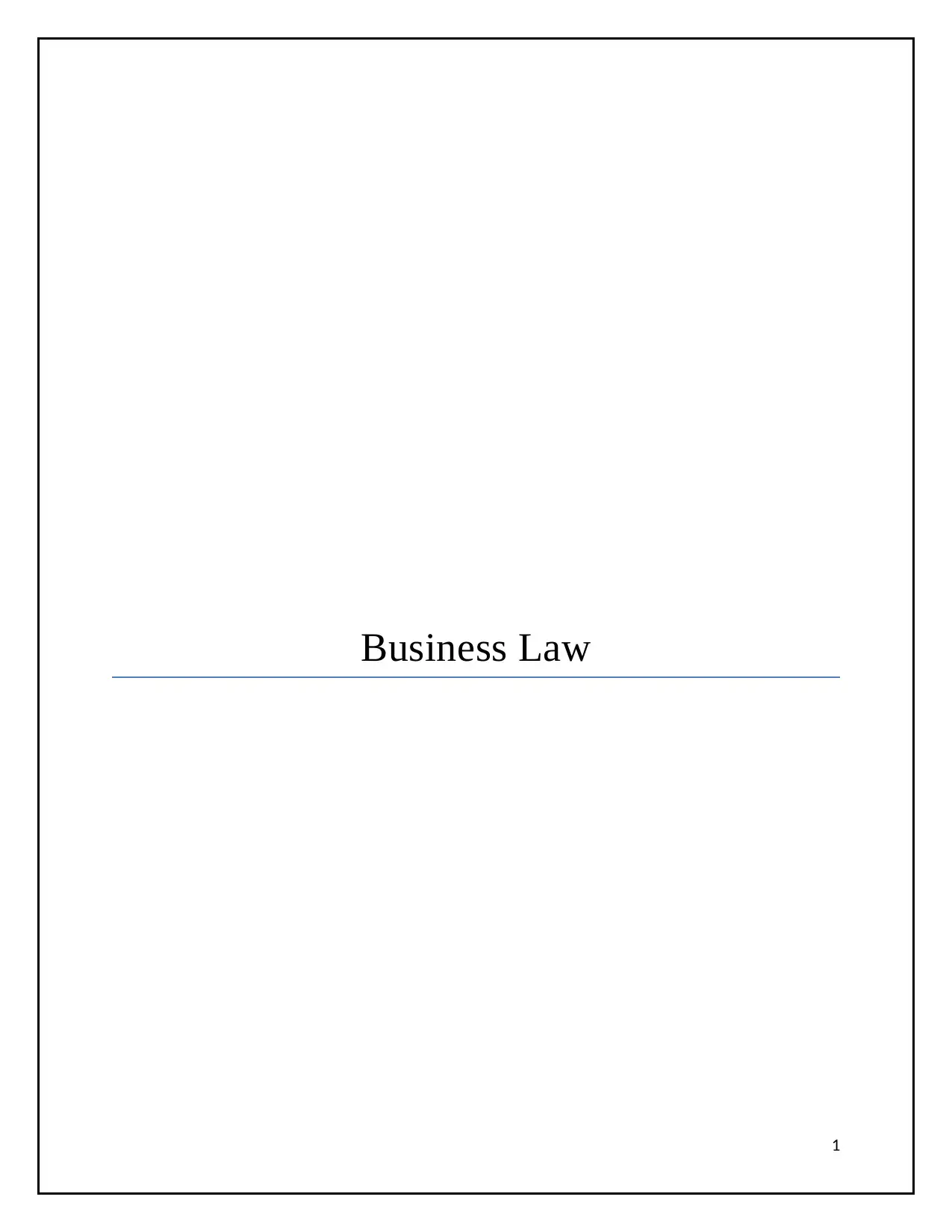
Business Law
1
1
Paraphrase This Document
Need a fresh take? Get an instant paraphrase of this document with our AI Paraphraser
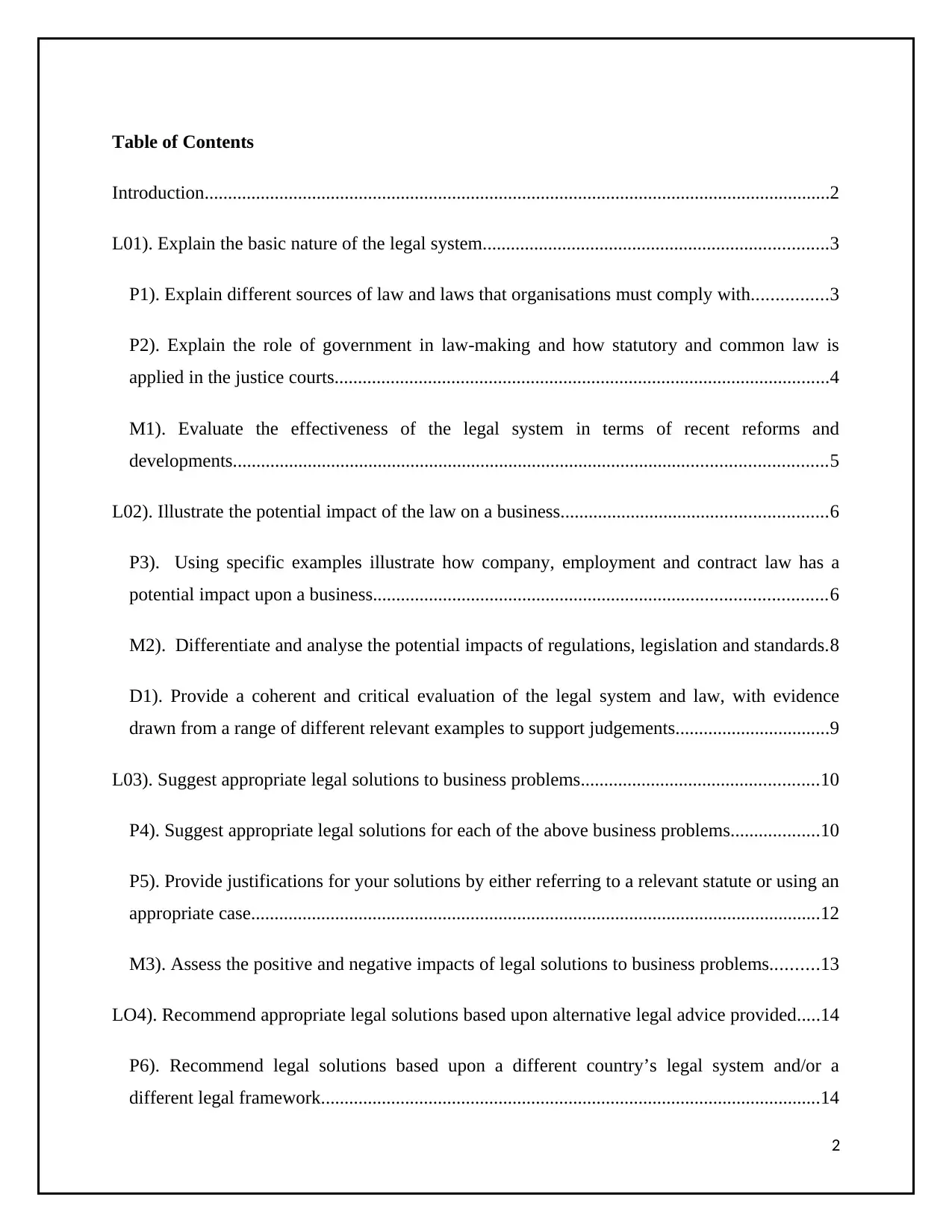
Table of Contents
Introduction......................................................................................................................................2
L01). Explain the basic nature of the legal system..........................................................................3
P1). Explain different sources of law and laws that organisations must comply with................3
P2). Explain the role of government in law-making and how statutory and common law is
applied in the justice courts..........................................................................................................4
M1). Evaluate the effectiveness of the legal system in terms of recent reforms and
developments...............................................................................................................................5
L02). Illustrate the potential impact of the law on a business.........................................................6
P3). Using specific examples illustrate how company, employment and contract law has a
potential impact upon a business.................................................................................................6
M2). Differentiate and analyse the potential impacts of regulations, legislation and standards.8
D1). Provide a coherent and critical evaluation of the legal system and law, with evidence
drawn from a range of different relevant examples to support judgements.................................9
L03). Suggest appropriate legal solutions to business problems...................................................10
P4). Suggest appropriate legal solutions for each of the above business problems...................10
P5). Provide justifications for your solutions by either referring to a relevant statute or using an
appropriate case..........................................................................................................................12
M3). Assess the positive and negative impacts of legal solutions to business problems..........13
LO4). Recommend appropriate legal solutions based upon alternative legal advice provided.....14
P6). Recommend legal solutions based upon a different country’s legal system and/or a
different legal framework...........................................................................................................14
2
Introduction......................................................................................................................................2
L01). Explain the basic nature of the legal system..........................................................................3
P1). Explain different sources of law and laws that organisations must comply with................3
P2). Explain the role of government in law-making and how statutory and common law is
applied in the justice courts..........................................................................................................4
M1). Evaluate the effectiveness of the legal system in terms of recent reforms and
developments...............................................................................................................................5
L02). Illustrate the potential impact of the law on a business.........................................................6
P3). Using specific examples illustrate how company, employment and contract law has a
potential impact upon a business.................................................................................................6
M2). Differentiate and analyse the potential impacts of regulations, legislation and standards.8
D1). Provide a coherent and critical evaluation of the legal system and law, with evidence
drawn from a range of different relevant examples to support judgements.................................9
L03). Suggest appropriate legal solutions to business problems...................................................10
P4). Suggest appropriate legal solutions for each of the above business problems...................10
P5). Provide justifications for your solutions by either referring to a relevant statute or using an
appropriate case..........................................................................................................................12
M3). Assess the positive and negative impacts of legal solutions to business problems..........13
LO4). Recommend appropriate legal solutions based upon alternative legal advice provided.....14
P6). Recommend legal solutions based upon a different country’s legal system and/or a
different legal framework...........................................................................................................14
2
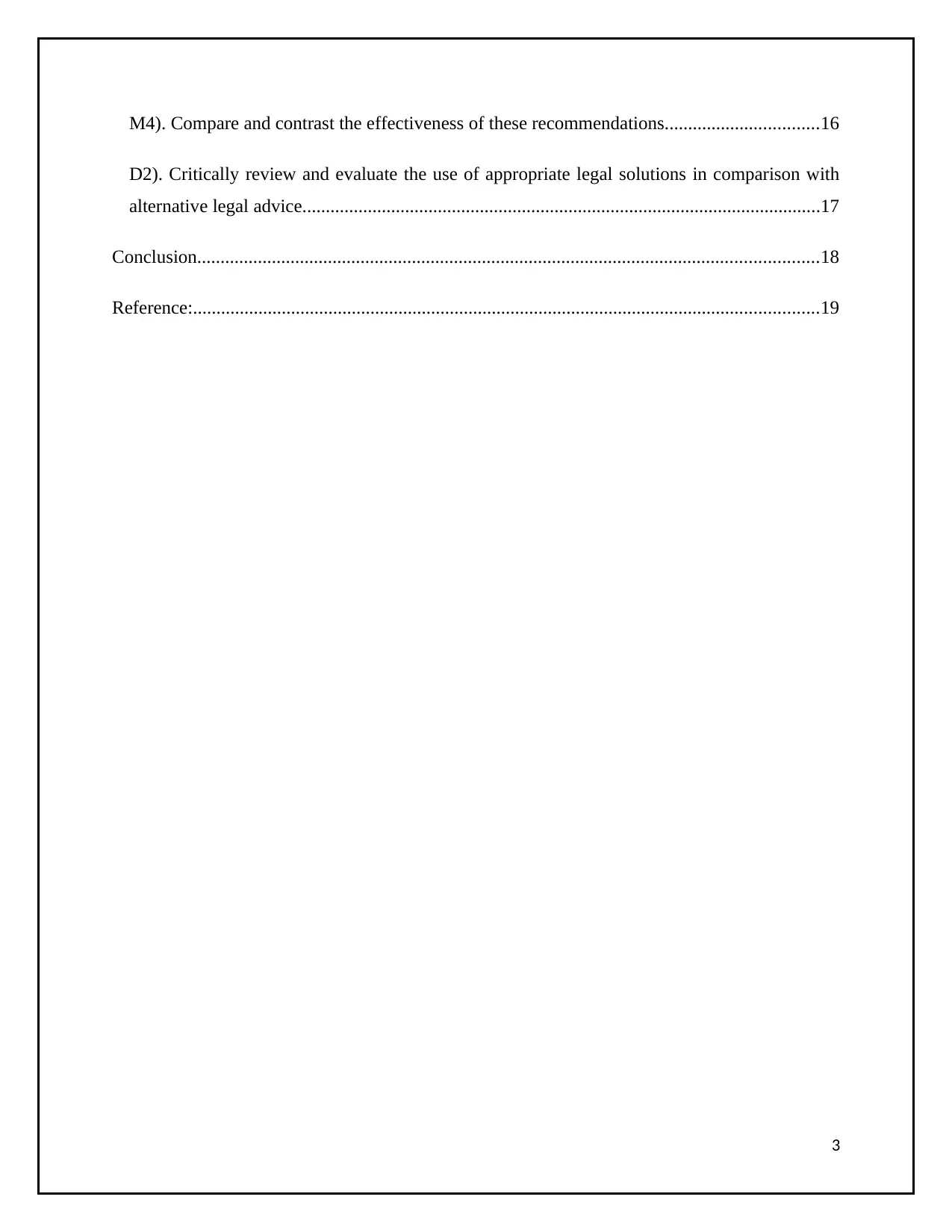
M4). Compare and contrast the effectiveness of these recommendations.................................16
D2). Critically review and evaluate the use of appropriate legal solutions in comparison with
alternative legal advice...............................................................................................................17
Conclusion.....................................................................................................................................18
Reference:......................................................................................................................................19
3
D2). Critically review and evaluate the use of appropriate legal solutions in comparison with
alternative legal advice...............................................................................................................17
Conclusion.....................................................................................................................................18
Reference:......................................................................................................................................19
3
⊘ This is a preview!⊘
Do you want full access?
Subscribe today to unlock all pages.

Trusted by 1+ million students worldwide
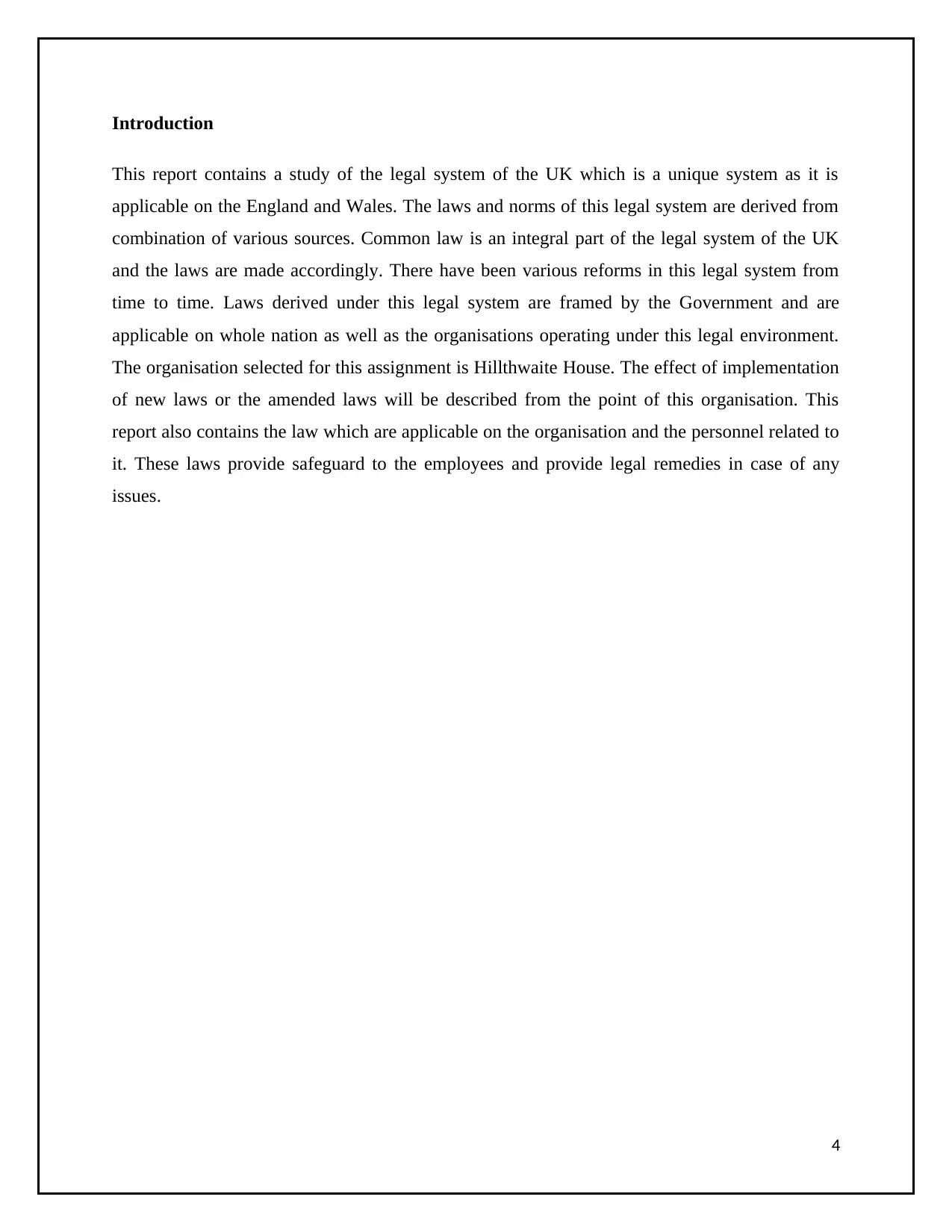
Introduction
This report contains a study of the legal system of the UK which is a unique system as it is
applicable on the England and Wales. The laws and norms of this legal system are derived from
combination of various sources. Common law is an integral part of the legal system of the UK
and the laws are made accordingly. There have been various reforms in this legal system from
time to time. Laws derived under this legal system are framed by the Government and are
applicable on whole nation as well as the organisations operating under this legal environment.
The organisation selected for this assignment is Hillthwaite House. The effect of implementation
of new laws or the amended laws will be described from the point of this organisation. This
report also contains the law which are applicable on the organisation and the personnel related to
it. These laws provide safeguard to the employees and provide legal remedies in case of any
issues.
4
This report contains a study of the legal system of the UK which is a unique system as it is
applicable on the England and Wales. The laws and norms of this legal system are derived from
combination of various sources. Common law is an integral part of the legal system of the UK
and the laws are made accordingly. There have been various reforms in this legal system from
time to time. Laws derived under this legal system are framed by the Government and are
applicable on whole nation as well as the organisations operating under this legal environment.
The organisation selected for this assignment is Hillthwaite House. The effect of implementation
of new laws or the amended laws will be described from the point of this organisation. This
report also contains the law which are applicable on the organisation and the personnel related to
it. These laws provide safeguard to the employees and provide legal remedies in case of any
issues.
4
Paraphrase This Document
Need a fresh take? Get an instant paraphrase of this document with our AI Paraphraser
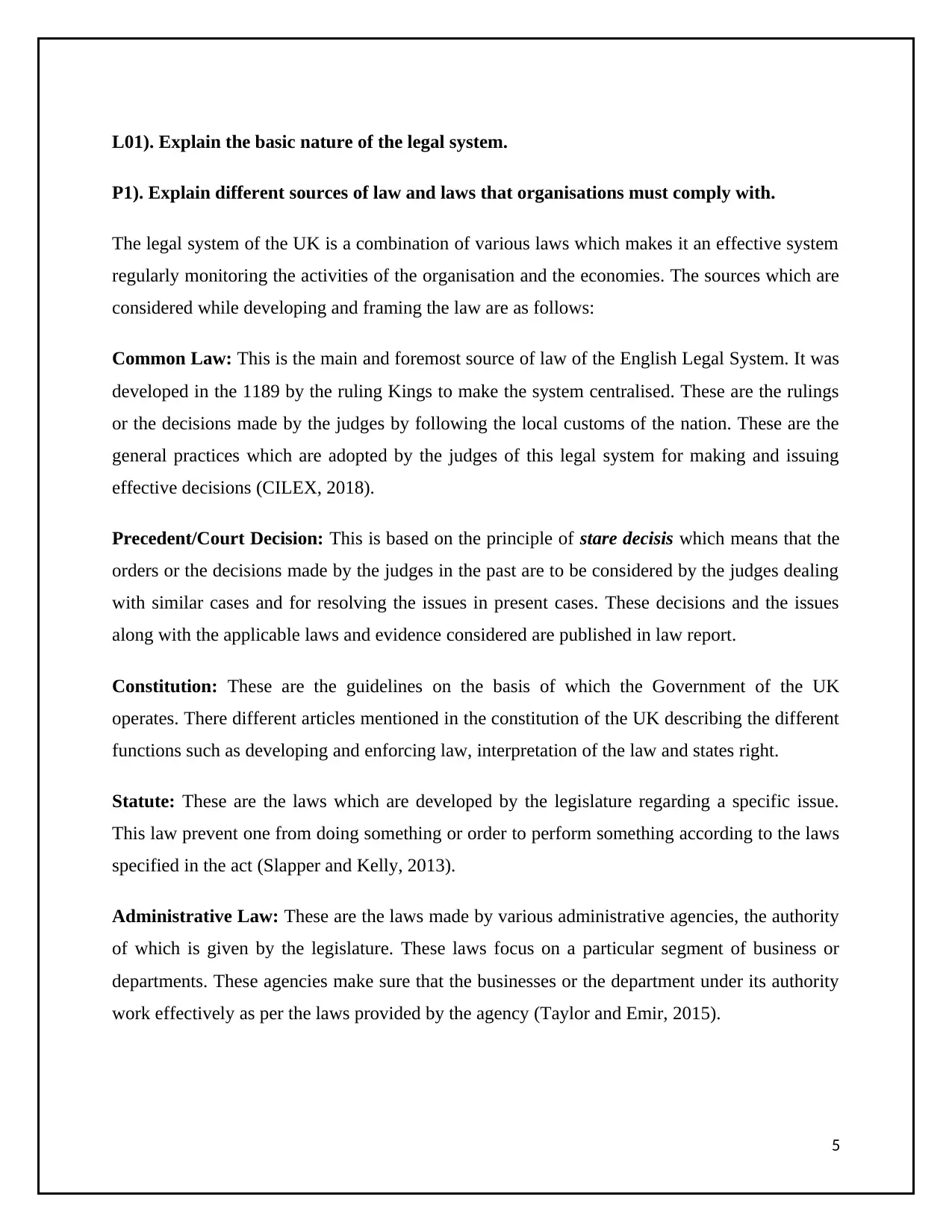
L01). Explain the basic nature of the legal system.
P1). Explain different sources of law and laws that organisations must comply with.
The legal system of the UK is a combination of various laws which makes it an effective system
regularly monitoring the activities of the organisation and the economies. The sources which are
considered while developing and framing the law are as follows:
Common Law: This is the main and foremost source of law of the English Legal System. It was
developed in the 1189 by the ruling Kings to make the system centralised. These are the rulings
or the decisions made by the judges by following the local customs of the nation. These are the
general practices which are adopted by the judges of this legal system for making and issuing
effective decisions (CILEX, 2018).
Precedent/Court Decision: This is based on the principle of stare decisis which means that the
orders or the decisions made by the judges in the past are to be considered by the judges dealing
with similar cases and for resolving the issues in present cases. These decisions and the issues
along with the applicable laws and evidence considered are published in law report.
Constitution: These are the guidelines on the basis of which the Government of the UK
operates. There different articles mentioned in the constitution of the UK describing the different
functions such as developing and enforcing law, interpretation of the law and states right.
Statute: These are the laws which are developed by the legislature regarding a specific issue.
This law prevent one from doing something or order to perform something according to the laws
specified in the act (Slapper and Kelly, 2013).
Administrative Law: These are the laws made by various administrative agencies, the authority
of which is given by the legislature. These laws focus on a particular segment of business or
departments. These agencies make sure that the businesses or the department under its authority
work effectively as per the laws provided by the agency (Taylor and Emir, 2015).
5
P1). Explain different sources of law and laws that organisations must comply with.
The legal system of the UK is a combination of various laws which makes it an effective system
regularly monitoring the activities of the organisation and the economies. The sources which are
considered while developing and framing the law are as follows:
Common Law: This is the main and foremost source of law of the English Legal System. It was
developed in the 1189 by the ruling Kings to make the system centralised. These are the rulings
or the decisions made by the judges by following the local customs of the nation. These are the
general practices which are adopted by the judges of this legal system for making and issuing
effective decisions (CILEX, 2018).
Precedent/Court Decision: This is based on the principle of stare decisis which means that the
orders or the decisions made by the judges in the past are to be considered by the judges dealing
with similar cases and for resolving the issues in present cases. These decisions and the issues
along with the applicable laws and evidence considered are published in law report.
Constitution: These are the guidelines on the basis of which the Government of the UK
operates. There different articles mentioned in the constitution of the UK describing the different
functions such as developing and enforcing law, interpretation of the law and states right.
Statute: These are the laws which are developed by the legislature regarding a specific issue.
This law prevent one from doing something or order to perform something according to the laws
specified in the act (Slapper and Kelly, 2013).
Administrative Law: These are the laws made by various administrative agencies, the authority
of which is given by the legislature. These laws focus on a particular segment of business or
departments. These agencies make sure that the businesses or the department under its authority
work effectively as per the laws provided by the agency (Taylor and Emir, 2015).
5

Hillthwaite House is an organisation working under the hospitality sector of business and must
make sure to comply with the laws made by keeping the consistency with these above mentioned
sources.
6
make sure to comply with the laws made by keeping the consistency with these above mentioned
sources.
6
⊘ This is a preview!⊘
Do you want full access?
Subscribe today to unlock all pages.

Trusted by 1+ million students worldwide
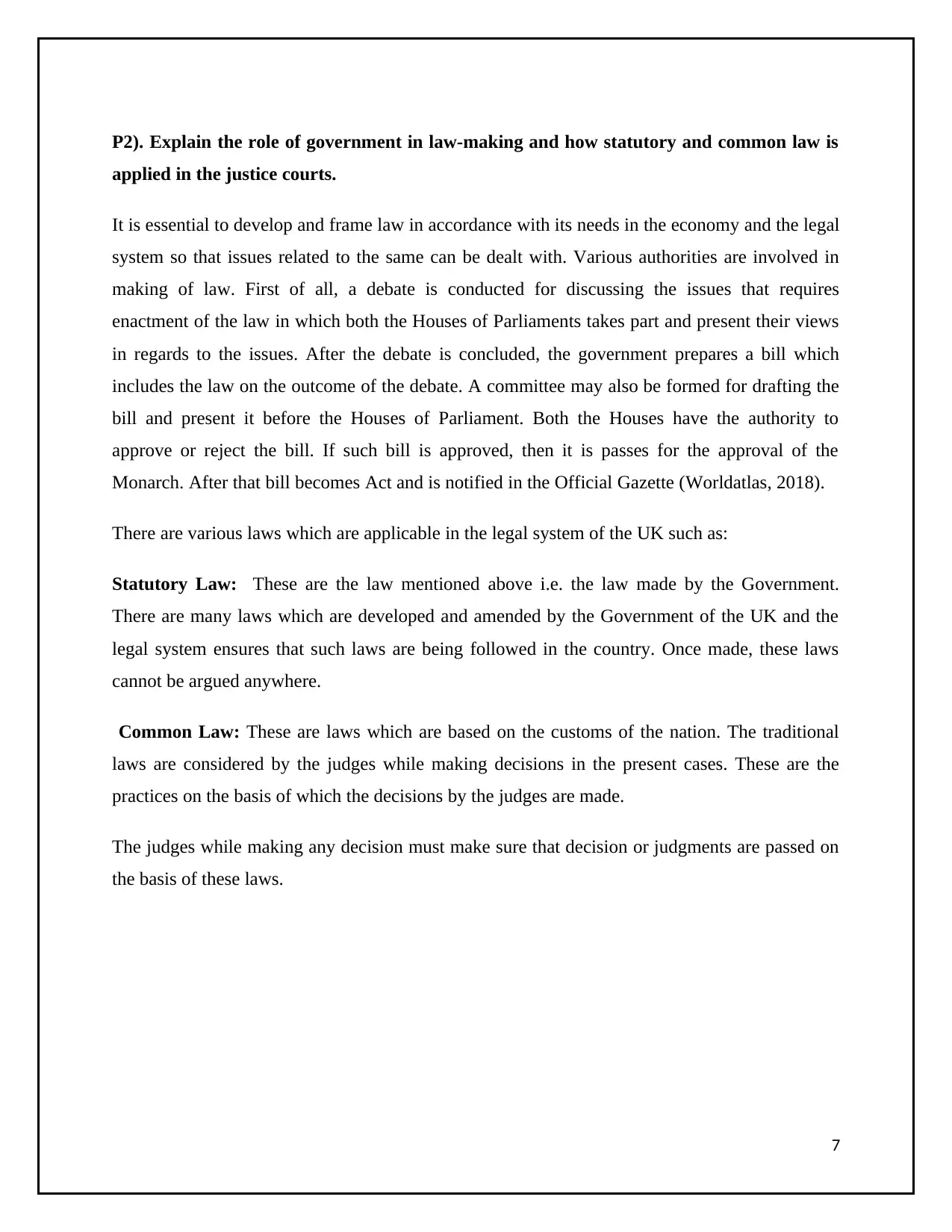
P2). Explain the role of government in law-making and how statutory and common law is
applied in the justice courts.
It is essential to develop and frame law in accordance with its needs in the economy and the legal
system so that issues related to the same can be dealt with. Various authorities are involved in
making of law. First of all, a debate is conducted for discussing the issues that requires
enactment of the law in which both the Houses of Parliaments takes part and present their views
in regards to the issues. After the debate is concluded, the government prepares a bill which
includes the law on the outcome of the debate. A committee may also be formed for drafting the
bill and present it before the Houses of Parliament. Both the Houses have the authority to
approve or reject the bill. If such bill is approved, then it is passes for the approval of the
Monarch. After that bill becomes Act and is notified in the Official Gazette (Worldatlas, 2018).
There are various laws which are applicable in the legal system of the UK such as:
Statutory Law: These are the law mentioned above i.e. the law made by the Government.
There are many laws which are developed and amended by the Government of the UK and the
legal system ensures that such laws are being followed in the country. Once made, these laws
cannot be argued anywhere.
Common Law: These are laws which are based on the customs of the nation. The traditional
laws are considered by the judges while making decisions in the present cases. These are the
practices on the basis of which the decisions by the judges are made.
The judges while making any decision must make sure that decision or judgments are passed on
the basis of these laws.
7
applied in the justice courts.
It is essential to develop and frame law in accordance with its needs in the economy and the legal
system so that issues related to the same can be dealt with. Various authorities are involved in
making of law. First of all, a debate is conducted for discussing the issues that requires
enactment of the law in which both the Houses of Parliaments takes part and present their views
in regards to the issues. After the debate is concluded, the government prepares a bill which
includes the law on the outcome of the debate. A committee may also be formed for drafting the
bill and present it before the Houses of Parliament. Both the Houses have the authority to
approve or reject the bill. If such bill is approved, then it is passes for the approval of the
Monarch. After that bill becomes Act and is notified in the Official Gazette (Worldatlas, 2018).
There are various laws which are applicable in the legal system of the UK such as:
Statutory Law: These are the law mentioned above i.e. the law made by the Government.
There are many laws which are developed and amended by the Government of the UK and the
legal system ensures that such laws are being followed in the country. Once made, these laws
cannot be argued anywhere.
Common Law: These are laws which are based on the customs of the nation. The traditional
laws are considered by the judges while making decisions in the present cases. These are the
practices on the basis of which the decisions by the judges are made.
The judges while making any decision must make sure that decision or judgments are passed on
the basis of these laws.
7
Paraphrase This Document
Need a fresh take? Get an instant paraphrase of this document with our AI Paraphraser
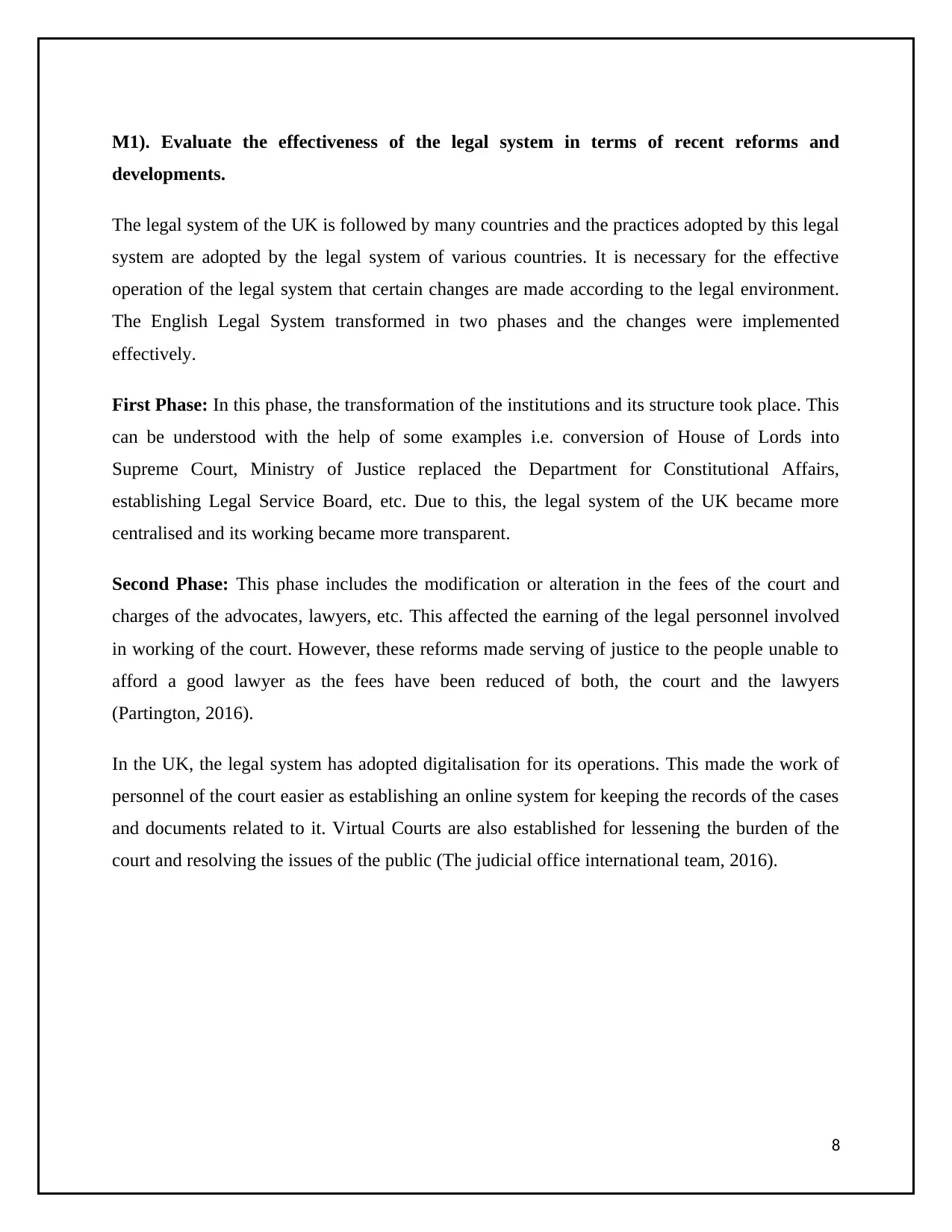
M1). Evaluate the effectiveness of the legal system in terms of recent reforms and
developments.
The legal system of the UK is followed by many countries and the practices adopted by this legal
system are adopted by the legal system of various countries. It is necessary for the effective
operation of the legal system that certain changes are made according to the legal environment.
The English Legal System transformed in two phases and the changes were implemented
effectively.
First Phase: In this phase, the transformation of the institutions and its structure took place. This
can be understood with the help of some examples i.e. conversion of House of Lords into
Supreme Court, Ministry of Justice replaced the Department for Constitutional Affairs,
establishing Legal Service Board, etc. Due to this, the legal system of the UK became more
centralised and its working became more transparent.
Second Phase: This phase includes the modification or alteration in the fees of the court and
charges of the advocates, lawyers, etc. This affected the earning of the legal personnel involved
in working of the court. However, these reforms made serving of justice to the people unable to
afford a good lawyer as the fees have been reduced of both, the court and the lawyers
(Partington, 2016).
In the UK, the legal system has adopted digitalisation for its operations. This made the work of
personnel of the court easier as establishing an online system for keeping the records of the cases
and documents related to it. Virtual Courts are also established for lessening the burden of the
court and resolving the issues of the public (The judicial office international team, 2016).
8
developments.
The legal system of the UK is followed by many countries and the practices adopted by this legal
system are adopted by the legal system of various countries. It is necessary for the effective
operation of the legal system that certain changes are made according to the legal environment.
The English Legal System transformed in two phases and the changes were implemented
effectively.
First Phase: In this phase, the transformation of the institutions and its structure took place. This
can be understood with the help of some examples i.e. conversion of House of Lords into
Supreme Court, Ministry of Justice replaced the Department for Constitutional Affairs,
establishing Legal Service Board, etc. Due to this, the legal system of the UK became more
centralised and its working became more transparent.
Second Phase: This phase includes the modification or alteration in the fees of the court and
charges of the advocates, lawyers, etc. This affected the earning of the legal personnel involved
in working of the court. However, these reforms made serving of justice to the people unable to
afford a good lawyer as the fees have been reduced of both, the court and the lawyers
(Partington, 2016).
In the UK, the legal system has adopted digitalisation for its operations. This made the work of
personnel of the court easier as establishing an online system for keeping the records of the cases
and documents related to it. Virtual Courts are also established for lessening the burden of the
court and resolving the issues of the public (The judicial office international team, 2016).
8
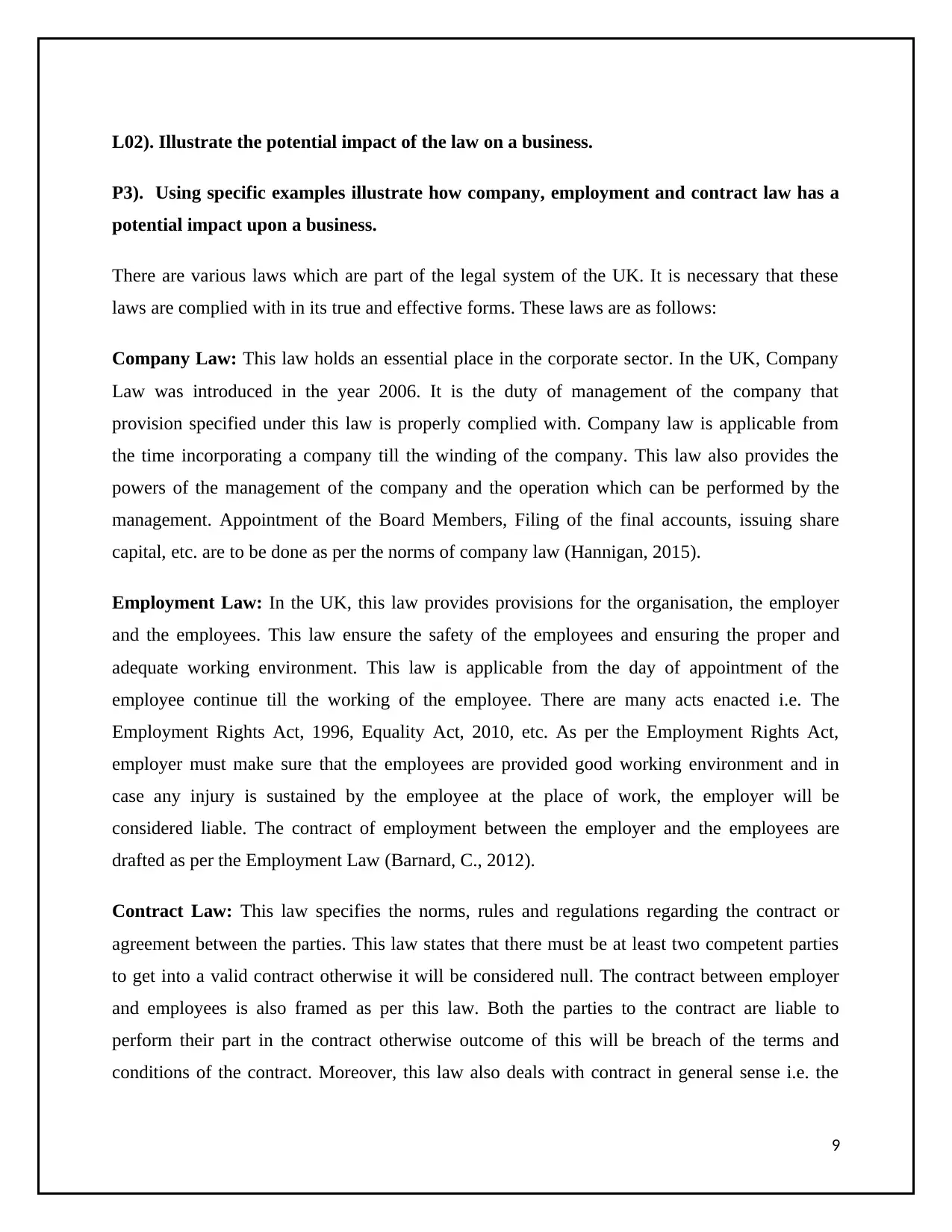
L02). Illustrate the potential impact of the law on a business.
P3). Using specific examples illustrate how company, employment and contract law has a
potential impact upon a business.
There are various laws which are part of the legal system of the UK. It is necessary that these
laws are complied with in its true and effective forms. These laws are as follows:
Company Law: This law holds an essential place in the corporate sector. In the UK, Company
Law was introduced in the year 2006. It is the duty of management of the company that
provision specified under this law is properly complied with. Company law is applicable from
the time incorporating a company till the winding of the company. This law also provides the
powers of the management of the company and the operation which can be performed by the
management. Appointment of the Board Members, Filing of the final accounts, issuing share
capital, etc. are to be done as per the norms of company law (Hannigan, 2015).
Employment Law: In the UK, this law provides provisions for the organisation, the employer
and the employees. This law ensure the safety of the employees and ensuring the proper and
adequate working environment. This law is applicable from the day of appointment of the
employee continue till the working of the employee. There are many acts enacted i.e. The
Employment Rights Act, 1996, Equality Act, 2010, etc. As per the Employment Rights Act,
employer must make sure that the employees are provided good working environment and in
case any injury is sustained by the employee at the place of work, the employer will be
considered liable. The contract of employment between the employer and the employees are
drafted as per the Employment Law (Barnard, C., 2012).
Contract Law: This law specifies the norms, rules and regulations regarding the contract or
agreement between the parties. This law states that there must be at least two competent parties
to get into a valid contract otherwise it will be considered null. The contract between employer
and employees is also framed as per this law. Both the parties to the contract are liable to
perform their part in the contract otherwise outcome of this will be breach of the terms and
conditions of the contract. Moreover, this law also deals with contract in general sense i.e. the
9
P3). Using specific examples illustrate how company, employment and contract law has a
potential impact upon a business.
There are various laws which are part of the legal system of the UK. It is necessary that these
laws are complied with in its true and effective forms. These laws are as follows:
Company Law: This law holds an essential place in the corporate sector. In the UK, Company
Law was introduced in the year 2006. It is the duty of management of the company that
provision specified under this law is properly complied with. Company law is applicable from
the time incorporating a company till the winding of the company. This law also provides the
powers of the management of the company and the operation which can be performed by the
management. Appointment of the Board Members, Filing of the final accounts, issuing share
capital, etc. are to be done as per the norms of company law (Hannigan, 2015).
Employment Law: In the UK, this law provides provisions for the organisation, the employer
and the employees. This law ensure the safety of the employees and ensuring the proper and
adequate working environment. This law is applicable from the day of appointment of the
employee continue till the working of the employee. There are many acts enacted i.e. The
Employment Rights Act, 1996, Equality Act, 2010, etc. As per the Employment Rights Act,
employer must make sure that the employees are provided good working environment and in
case any injury is sustained by the employee at the place of work, the employer will be
considered liable. The contract of employment between the employer and the employees are
drafted as per the Employment Law (Barnard, C., 2012).
Contract Law: This law specifies the norms, rules and regulations regarding the contract or
agreement between the parties. This law states that there must be at least two competent parties
to get into a valid contract otherwise it will be considered null. The contract between employer
and employees is also framed as per this law. Both the parties to the contract are liable to
perform their part in the contract otherwise outcome of this will be breach of the terms and
conditions of the contract. Moreover, this law also deals with contract in general sense i.e. the
9
⊘ This is a preview!⊘
Do you want full access?
Subscribe today to unlock all pages.

Trusted by 1+ million students worldwide
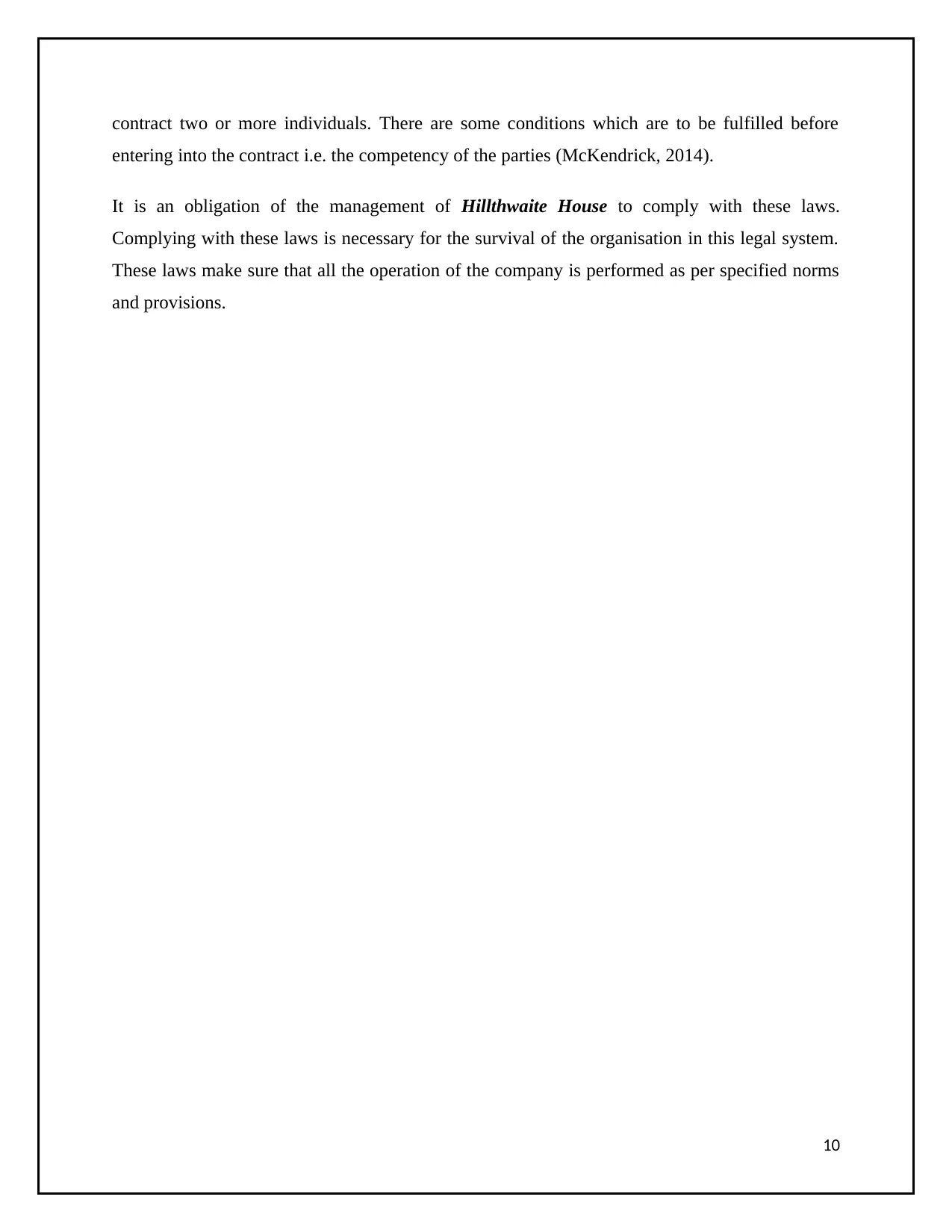
contract two or more individuals. There are some conditions which are to be fulfilled before
entering into the contract i.e. the competency of the parties (McKendrick, 2014).
It is an obligation of the management of Hillthwaite House to comply with these laws.
Complying with these laws is necessary for the survival of the organisation in this legal system.
These laws make sure that all the operation of the company is performed as per specified norms
and provisions.
10
entering into the contract i.e. the competency of the parties (McKendrick, 2014).
It is an obligation of the management of Hillthwaite House to comply with these laws.
Complying with these laws is necessary for the survival of the organisation in this legal system.
These laws make sure that all the operation of the company is performed as per specified norms
and provisions.
10
Paraphrase This Document
Need a fresh take? Get an instant paraphrase of this document with our AI Paraphraser
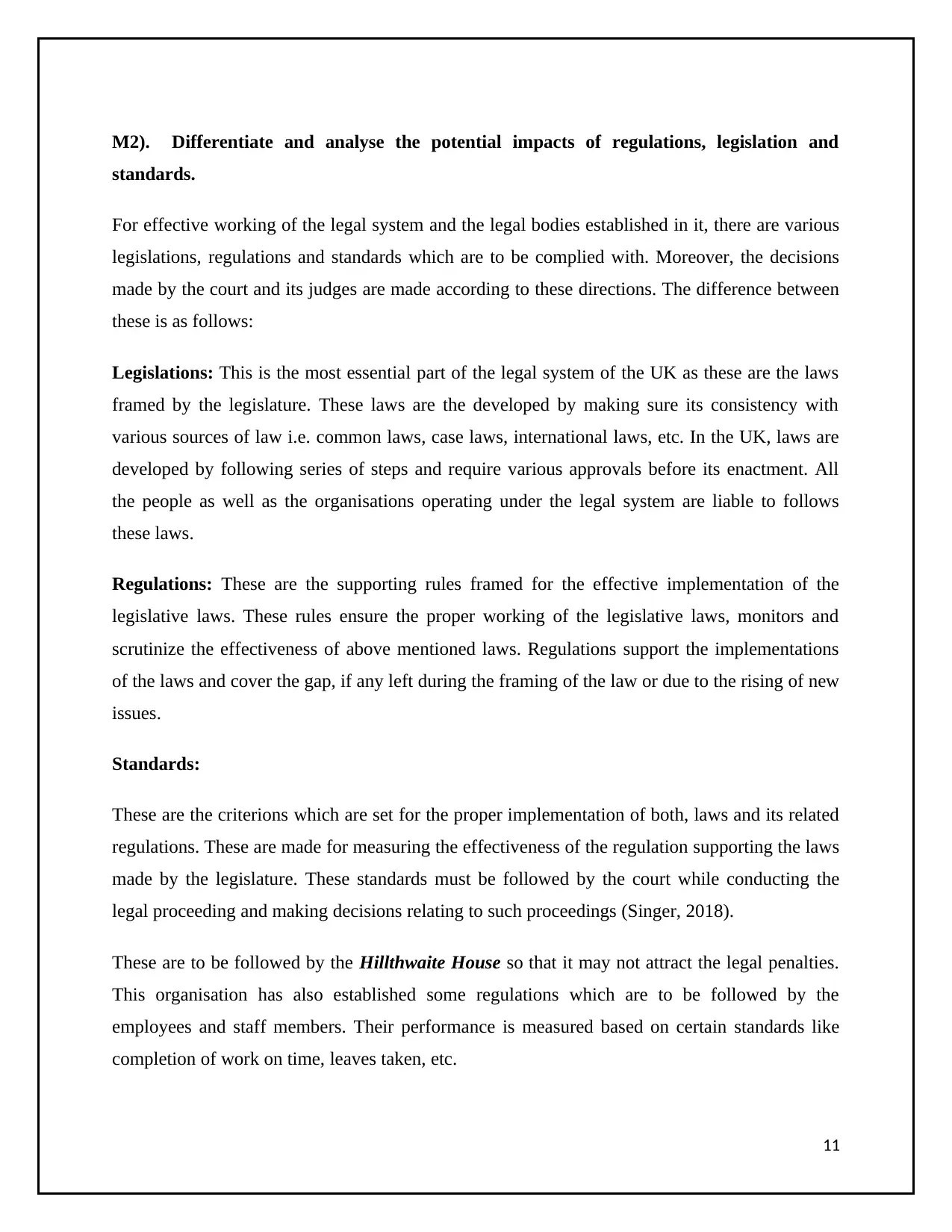
M2). Differentiate and analyse the potential impacts of regulations, legislation and
standards.
For effective working of the legal system and the legal bodies established in it, there are various
legislations, regulations and standards which are to be complied with. Moreover, the decisions
made by the court and its judges are made according to these directions. The difference between
these is as follows:
Legislations: This is the most essential part of the legal system of the UK as these are the laws
framed by the legislature. These laws are the developed by making sure its consistency with
various sources of law i.e. common laws, case laws, international laws, etc. In the UK, laws are
developed by following series of steps and require various approvals before its enactment. All
the people as well as the organisations operating under the legal system are liable to follows
these laws.
Regulations: These are the supporting rules framed for the effective implementation of the
legislative laws. These rules ensure the proper working of the legislative laws, monitors and
scrutinize the effectiveness of above mentioned laws. Regulations support the implementations
of the laws and cover the gap, if any left during the framing of the law or due to the rising of new
issues.
Standards:
These are the criterions which are set for the proper implementation of both, laws and its related
regulations. These are made for measuring the effectiveness of the regulation supporting the laws
made by the legislature. These standards must be followed by the court while conducting the
legal proceeding and making decisions relating to such proceedings (Singer, 2018).
These are to be followed by the Hillthwaite House so that it may not attract the legal penalties.
This organisation has also established some regulations which are to be followed by the
employees and staff members. Their performance is measured based on certain standards like
completion of work on time, leaves taken, etc.
11
standards.
For effective working of the legal system and the legal bodies established in it, there are various
legislations, regulations and standards which are to be complied with. Moreover, the decisions
made by the court and its judges are made according to these directions. The difference between
these is as follows:
Legislations: This is the most essential part of the legal system of the UK as these are the laws
framed by the legislature. These laws are the developed by making sure its consistency with
various sources of law i.e. common laws, case laws, international laws, etc. In the UK, laws are
developed by following series of steps and require various approvals before its enactment. All
the people as well as the organisations operating under the legal system are liable to follows
these laws.
Regulations: These are the supporting rules framed for the effective implementation of the
legislative laws. These rules ensure the proper working of the legislative laws, monitors and
scrutinize the effectiveness of above mentioned laws. Regulations support the implementations
of the laws and cover the gap, if any left during the framing of the law or due to the rising of new
issues.
Standards:
These are the criterions which are set for the proper implementation of both, laws and its related
regulations. These are made for measuring the effectiveness of the regulation supporting the laws
made by the legislature. These standards must be followed by the court while conducting the
legal proceeding and making decisions relating to such proceedings (Singer, 2018).
These are to be followed by the Hillthwaite House so that it may not attract the legal penalties.
This organisation has also established some regulations which are to be followed by the
employees and staff members. Their performance is measured based on certain standards like
completion of work on time, leaves taken, etc.
11
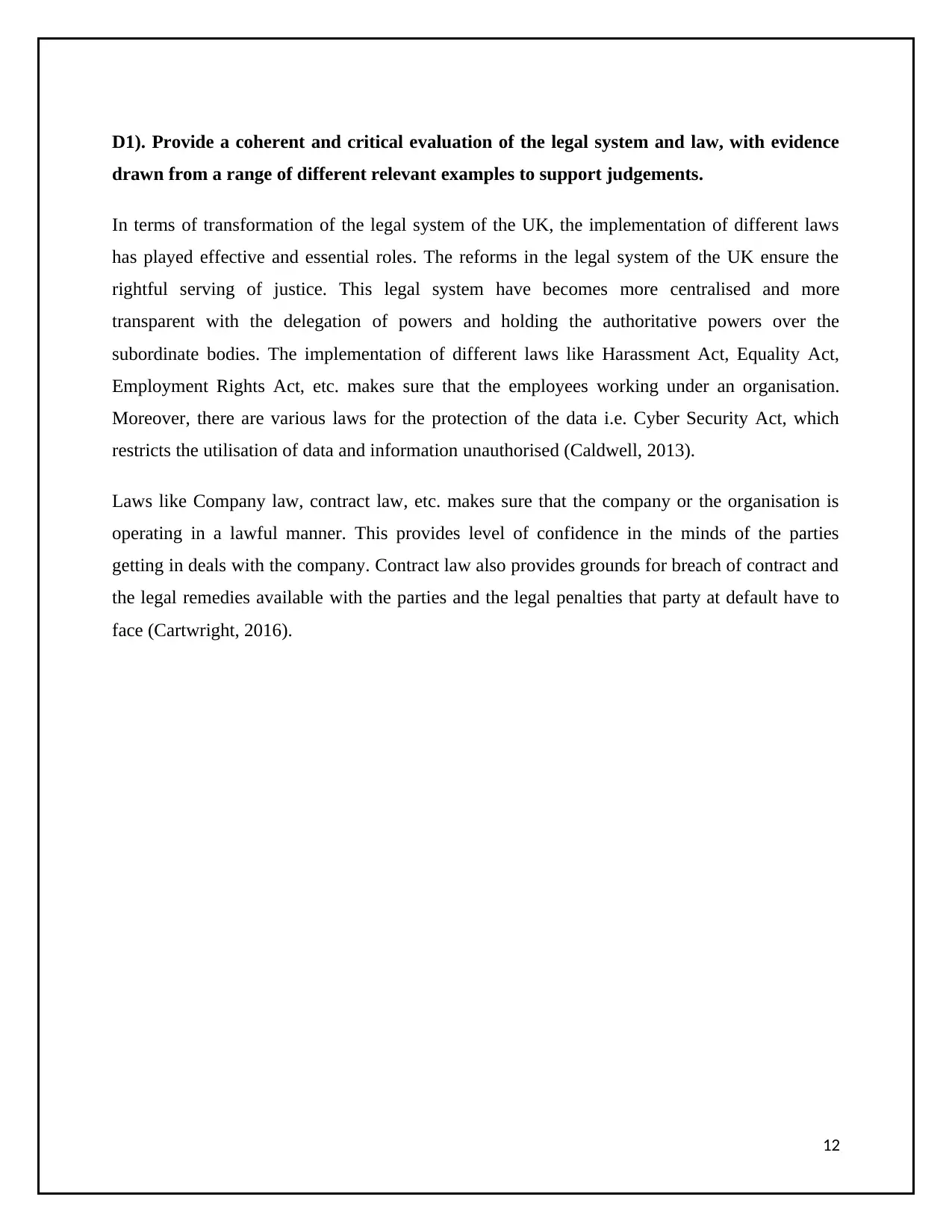
D1). Provide a coherent and critical evaluation of the legal system and law, with evidence
drawn from a range of different relevant examples to support judgements.
In terms of transformation of the legal system of the UK, the implementation of different laws
has played effective and essential roles. The reforms in the legal system of the UK ensure the
rightful serving of justice. This legal system have becomes more centralised and more
transparent with the delegation of powers and holding the authoritative powers over the
subordinate bodies. The implementation of different laws like Harassment Act, Equality Act,
Employment Rights Act, etc. makes sure that the employees working under an organisation.
Moreover, there are various laws for the protection of the data i.e. Cyber Security Act, which
restricts the utilisation of data and information unauthorised (Caldwell, 2013).
Laws like Company law, contract law, etc. makes sure that the company or the organisation is
operating in a lawful manner. This provides level of confidence in the minds of the parties
getting in deals with the company. Contract law also provides grounds for breach of contract and
the legal remedies available with the parties and the legal penalties that party at default have to
face (Cartwright, 2016).
12
drawn from a range of different relevant examples to support judgements.
In terms of transformation of the legal system of the UK, the implementation of different laws
has played effective and essential roles. The reforms in the legal system of the UK ensure the
rightful serving of justice. This legal system have becomes more centralised and more
transparent with the delegation of powers and holding the authoritative powers over the
subordinate bodies. The implementation of different laws like Harassment Act, Equality Act,
Employment Rights Act, etc. makes sure that the employees working under an organisation.
Moreover, there are various laws for the protection of the data i.e. Cyber Security Act, which
restricts the utilisation of data and information unauthorised (Caldwell, 2013).
Laws like Company law, contract law, etc. makes sure that the company or the organisation is
operating in a lawful manner. This provides level of confidence in the minds of the parties
getting in deals with the company. Contract law also provides grounds for breach of contract and
the legal remedies available with the parties and the legal penalties that party at default have to
face (Cartwright, 2016).
12
⊘ This is a preview!⊘
Do you want full access?
Subscribe today to unlock all pages.

Trusted by 1+ million students worldwide
1 out of 23
Related Documents
Your All-in-One AI-Powered Toolkit for Academic Success.
+13062052269
info@desklib.com
Available 24*7 on WhatsApp / Email
![[object Object]](/_next/static/media/star-bottom.7253800d.svg)
Unlock your academic potential
Copyright © 2020–2026 A2Z Services. All Rights Reserved. Developed and managed by ZUCOL.





